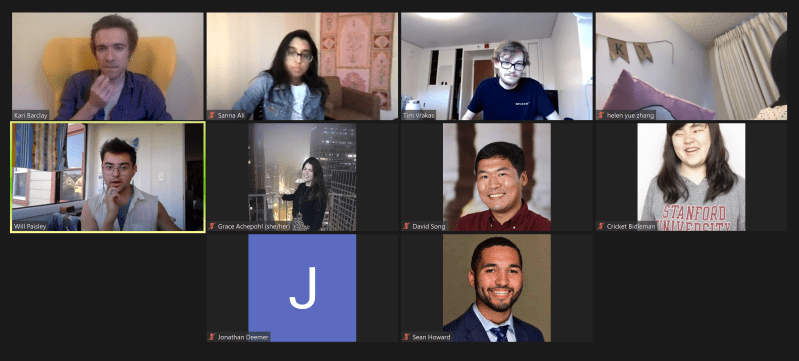Graduate Student Council (GSC) Representatives and students are urging the administration to freeze rent in the Escondido Village Graduate Residences (EVGR) until the University can provide a functional legal mailing address and substantial building facilities. At the Council’s Wednesday meeting, however, Stanford’s Residential & Dining Enterprises (R&DE) pushed back on a petition fighting against the rent hike, saying that they are necessary to meet the University’s funding needs for housing.
The Council also unanimously passed a slate of bills that will allow amendments to the Associated Students of Stanford University (ASSU) Constitution — including a move to a Single Transferable Voting (STV) system and the elimination of gendered language in the Constitution — to appear on the spring general election ballot.
Stanford plans to raise EVGR rents by approximately 3.5% in the 2021-2022 academic year.
The petition, which has garnered over 450 signatures in one week, contends that it is unfair of the University to continually raise rents while EVGR residents remain without fully functioning mailing addresses and access to the majority of the building’s facilities.
The topic of rent increases for graduate students has been a repeated point of contention between students and administrators. On average, rent for single-student housing on campus consists of more than 30% of the average graduate student’s salary, placing many graduate students in the “rent-burdened” category.
Amid the COVID-19 pandemic that has negatively impacted the financial situations of many their families, increasing numbers of graduate students are growing concerned with the rent hikes, according to councilors. Meanwhile, rent prices in the Bay Area have cratered in the past year due to decreased housing demand.
But according to executive director of R&DE Student Housing Operations Imogen Hinds, on-campus student housing prices are not linked to the off-campus market, a policy which benefits graduate students most years.
“We work to do everything we can to try to be as cost efficient as possible, as fiscally responsible,” Hinds said. She added that the rates determined by R&DE are to support labor and program costs, primarily debt service.
The topic of a dysfunctional mail system is an added layer to student concerns. According to Eva de la Serna, an EVGR resident and fourth-year Ph.D. chemical engineering candidate, mail workers regularly circle the building looking for stray packages, and residents have to use the front desk as their mailing address.
While acknowledging the students’ struggles, Hinds said that the issue of mailing addresses is a complex topic that will take time to fully resolve, despite R&DE’s best efforts. She thanked Serna for sharing the petition, adding that R&DE would be “more than happy” to meet with any students who would be willing to share their experiences and work toward an improved system.
Both Serna and Councilor Sanna Ali, a fourth year Ph.D. communication student, argued that placing the burden on graduate students to help fix these problems while raising rent prices is an inconsiderate expectation.
“I’m a full time graduate student. I don’t have time to solve this really complicated issue,” Serna said. “I think it’s important to realize that they’re quite complex issues that don’t just get resolved overnight, and I think that the rent price should reflect that.”
Constitutional amendments
The proposed amendments are part of an effort by student leaders on the Constitutional Review Committee to revamp the Constitution. Now that both the Undergraduate Senate and GSC have passed the amendments, students will vote on them during ASSU elections at the end of April.
To go into effect, the amendments would need to earn more than two thirds of the votes cast, equaling support from at least 15% of the total student population. Proposed changes include moving Undergraduate Senate elections to a Single Transferable Voting (STV) system and removing gendered language from the Constitution.
The STV, which allows voters to rank candidates, would be a shift from the current system, in which voters can pick only one candidate or slate. With the new voting system, votes cast for a particular set of candidates would be transferred to the voter’s second or third-ranked option if their top preference does not receive enough votes to win.
Such a system could push candidates to appeal to a broader audience in the hopes of earning second- or third-choice votes: “STV will push students campaigning for office to expand their outlook and build a broad coalition in support of their candidacy,” according to the Spring 2021 Interim Report by the Constitutional Review Committee.
The GSC also voted in favor of including the Gender Neutral Language Amendment on the ballot, culminating an effort that the Council has helped lead for months. The amendment would eliminate gendered language from the ASSU Constitution — which currently includes phrases such as “he or she” — in order to modernize a document that councilors have previously called “outdated.”
A third amendment, the Financial Clarification and Engagement Amendment, aims to simplify the ASSU financial system. The amendment focuses on two objectives: clarifying how the ASSU handles funding for voluntary student organizations and bolstering student understanding of the ASSU’s internal financial functions.
According to Undergraduate Senate Treasurer Tim Vrakas ’22, who also serves on the Constitutional Review Committee, the amendment’s primary goal is to ensure that student representatives can easily understand how the system works.
“How can the students even be represented in the system if their elected representatives don’t even really understand what’s going on?” Vrakas asked.
This article has been updated to reflect that Serna spoke on mail concerns for EVGR in her capacity as a resident, not as a community associate. This article has also been updated to clarify that the GSC itself did not take a position on rent hikes.
This article has been corrected to reflect that the petition against rent hikes is not a GSC petition. The Daily regrets this error.
